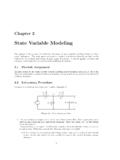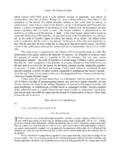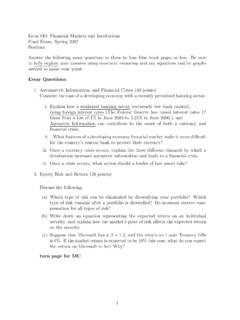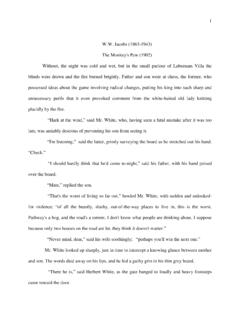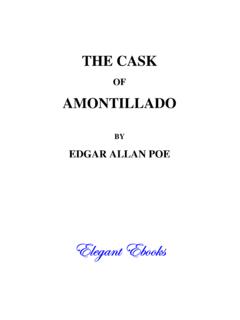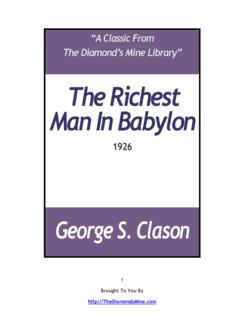Transcription of The Grand Inquisitor - University of Hawaiʻi
1 Fyodor Dostoevsky (1821-1881), author of such works as Crimeand Punishment, The Idiot, and The possessed , is considered bymany to be one of the world s greatest writers, and the novel TheBrothers Karamazov is universally recognized to be one ofgenuine masterpieces of world literature. Within this novel thestory, The Grand Inquisitor , is told by Ivan Karamazov to hisyounger brother Alyosha. The two brothers had just beendiscussing the problem of evil the classic problem of Christiantheology: if God is really all powerful, all knowing, and trulyloving, then why does evil exist? If God could not have preventedevil, then he is not all powerful. If evil somehow escapes hisawareness, then he is not all knowing. If he knew, and could dosomething about it, but chose not to, then how can he beconsidered a loving God? One solution to this problem is to claimthat evil does not really exist, that if we were to see the worldfrom God s perspective, from the perspective of eternity, theneverything comes out well in the end.
2 Another response is to claim that it really isn t God s fault at all, it isours. God gave us free-will and evil is the result of our misuse of that gift. Ivan will have none of thesearguments. He brings up the particularly troubling case of the suffering of innocent children how can theybe blamed and punished if they are innocent? Ivan cannot accept that the suffering of an innocent child willbe justified in the end. He refuses his ticket to heaven if the price is the suffering of one innocent child. Thedevout Alyosha then reminds his skeptical older brother of the One who gave His blood in order to forgivethe sins of all. Ivan then counters with his story, The Grand Inquisitor . In this story, Christ comes back,not at the end of the world, but during the worst days of the Inquisition, the day after a hundred heretics havebeen burned at the stake. The Grand Inquisitor , who presided over the burning of the heretics, has Christarrested, and thrown into the dungeon. The story recounts the Inquisitor s interrogation of Christ.
3 TheInquisitor claims that despite his good intentions, Christ misunderstood human nature, and that the Churchhas corrected his mistake. The story raises profound questions about human existence, the relationshipbetween faith and the examined life, and the problem of freedom. We pick up Dostoevsky s story as Ivan Karamazov begins to tell his story:The Grand Inquisitor .. My poem is set in Spain, at the most dreadful period of the Inquisition, when bonfires glowedthroughout the land every day to the glory of God andIn resplendent autos-da-fe Burned the wicked , this is not, of course, that coming in which He will appear, according to His promise, at theend of days in the clouds of heaven with power and great glory and which will take placesuddenly, "as the lightning cometh out of the east, and shineth even unto the west". No, He hasconceived the desire to visit his children at least for an instant and precisely in those places wherethe bonfires of heretics had begun to crackle.
4 In His boundless mercy He passes once more amongmen in that same human form in which for three years He walked among men fifteen centuriesearlier. He comes down to the "hot streets and squares" of the southern town in which only theprevious day, in a "resplendent auto-da-f ", in the presence of the king, the court, the knights, thecardinals and the loveliest ladies of the court, in the presence of the numerous population of all285286 Portrait of Fyodor Dostoyevsky, 1872 Introduction to Western PhilosophyDostoevsky: The Grand Inquisitor 2 Seville, there have been burned by the Cardinal Grand Inquisitor very nearly a good hundredheretics all in one go, ad majorem gloriam Dei. He has appeared quietly, unostentatiously, and yet strange, this everyone recognizes could have been one of the best bits in my poem I mean, the question of why it is thateveryone recognizes him. The people rush towards him with invincible force, surround him, massaround him, follow him. Saying nothing, He passes among them with a quiet smile of infinitecompassion.
5 The sun of love burns in his heart, the beams of Light, Enlightenment and Powerflow from his eyes and, as they stream over people, shake their hearts with answering love. Hestretches out His arms to them, blesses them, and from one touch of Him, even of His garments,there issues a healing force. Then from the crowd an old man, blind since the years of hischildhood, exclaims: "0 Lord, heal me, that I may behold thee," and lo, it is as though the scalesfall from the blind man's eyes, and he sees Him. The people weep and kiss the ground on whichHe walks. The children throw flowers in his path, singing and crying to Him: "Hosannah!" "It'sHim, it's Him," they all repeat, "it must be Him, it can't be anyone but Him." He stops in the parvis of Seville Cathedral just at the moment a white, open child's coffin isbeing borne with weeping into the place of worship: in it is a seven-year-old girl, the onlydaughter of a certain noble and distinguished citizen.
6 The dead child lies covered in flowers. "Hewill raise up your child," voices cry from the crowd to the weeping mother. The cathedral paterwho has come out to meet the coffin looks bewildered and knits his brows. But then the motherof the dead child utters a resounding wail. She throws herself at his feet: "If it is You, then raiseup my child!" she exclaims, stretching out her arms to him. The procession stops, the coffin islowered to the parvis floor, to his feet. He gazes with compassion, and his lips softly pronounceagain: "Talitha cumi" "Damsel, I say unto thee, arise." The girl rises in her coffin, sits up andlooks around her, smiling, with astonished, wide-open eyes. In her arms is the bouquet of whiteroses with which she had lain in the coffin. Among the people there are confusion, shouts, sobbing, and then suddenly, at that verymoment, on his way past the cathedral comes the Cardinal Grand Inquisitor himself. He is an old287 Auto-da-fe on Plaza Mayor, Madrid 1683, Francisco Rizi Introduction to Western PhilosophyDostoevsky: The Grand Inquisitor 3man of almost ninety, tall and straight, with a withered face and sunken eyes, in which, however,there is still a fiery, spark-like gleam.
7 Oh, he is not dressed in his resplendent cardinal's attire, theattire in which yesterday he showed himself off before the people as the enemies of the Romanfaith were being burned no, at this moment he wears only his old, coarse monkish him at a certain distance follow his surly assistants and servants and the "Holy" stops before the crowd and observes from a distance. He has seen it all, has seen the coffinbeing put down at His feet, has seen the damsel rise up, and a shadow has settled on his face. Heknits his thick, grey brows, and his eyes flash with an ill-boding fire. He extends his index fingerand orders the guards to arrest Him. And lo, such is his power and so accustomed, submissive and tremblingly obedient to him arethe people that the crowd immediately parts before the guards, and they, amidst the sepulchralsilence that has suddenly fallen, place their hands on Him and march Him away. Instantly, thecrowd, almost as one man, bow their heads to the ground before the Elder- Inquisitor , and withoututtering a word he blesses the people and passes on his way.
8 The Guard conduct the Captive toa narrow and murky vaulted prison in the ancient building of the Ecclesiastical Court and lockHim up in it. The day goes by, and the dark, passionate and "unbreathing" Seville night air "of lemon and of laurel reeks." In the midst of the deep murk the prison's iron door is suddenly opened and the old GrandInquisitor himself slowly enters the prison with a lamp in his hand. He is alone, the door instantlylocks again behind him. He pauses in the entrance and for a long time, a minute or two, studiesHis face. At last he quietly goes up to Him, places the lamp on the table and says to Him:"'Is it you? You?" Receiving no answer, however, he quickly adds:"No, do not reply, keep silent. And in any case, what could you possibly say? I know only toowell what you would say. And you have no right to add anything to what was said by you informer times. Why have you come to get in our way? For you have come to get in our way, andyou yourself know it. But do you know what will happen tomorrow?
9 I do not know who you are,and I do not want to know: you may be He or you may be only His likeness, but tomorrow I shallfind you guilty and burn you at the stake as the most wicked of heretics, and those same peoplewho today kissed your feet will tomorrow at one wave of my hand rush to rake up the embers onyour bonfire, do you know that?Yes, I dare say you do," he added in heartfelt reflection, not for one moment removing hisgaze from his Captive.''I don't quite understand this part of it, Ivan,' Alyosha smiled; all the time he had listened insilence. 'Is it simply an immense fantasy, or is it some mistake on the part of an old man, someimpossible quiproquo?'1'Why don't you assume it's the latter.' Ivan burst out laughing. 'If you've been so spoiled bycontemporary realism that you can't endure anything fantastic and you want it to be a quiproquo,then so be it. It certainly can't be denied,' he laughed again, 'that the old man is ninety, and mighteasily have long ago been driven insane by the idea that is in his mind.
10 On the other hand, theCaptive might have struck him by His appearance. Or it might simply have been a hallucination,the vision of a ninety-year-old man on the threshold of death, given added feverish intensity bythe previous day's auto-da-f of a hundred burned heretics. Is it not, however, a matter ofindifference to us whether it's a quiproquo, or whether it's a colossal fantasy? The point is merelythat the old man wants to speak his mind, to finally say out loud the things he has kept silent aboutfor ninety years.''And the Captive says nothing either? Gazes at him, but says no word?'1. quiproquo: a case of mistaken identity288 Introduction to Western PhilosophyDostoevsky: The Grand Inquisitor 4'But that is how it must be in all such instances,' Ivan laughed again. 'The old man himselfremarks to Him that He has not the right to add anything to what has already been said by Himin former times. If one cares to, one can see in that statement the most basic characteristic ofRoman Catholicism, in my opinion, at least; it's as if they were saying: "It was all told by you tothe Pope and so it is now all of it in the Pope's possession, and now we should appreciate it if youwould stay away altogether and refrain from interfering for the time being, at any rate.
